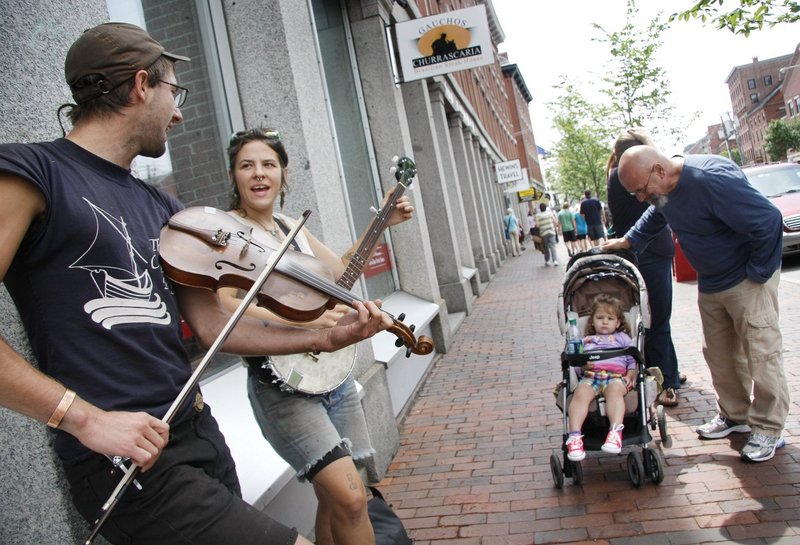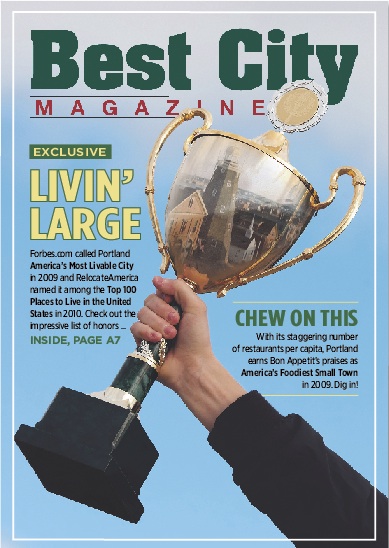Read the lists, and you’ll see how great Portland is.
America’s most livable city, proclaimed a list from Forbes.com. Third-best city for raising kids, cheered a list from Parenting magazine. Fifth-best city in the nation for hipsters, announced Travel + Leisure.
But wait — some lists say Portland’s not so great.
The city has the eighth worst-dressed population in America, according to Travel + Leisure, the same publication that tagged the city a hipster haven. And Men’s Health magazine’s list of 100 “Hotbeds of Sex” cities in 2010 had Portland dead last.
How can this be? Great place for hipsters and families, but worst place for fashion sense and sex?
“Apparently, the hipsters aren’t having sex. Maybe they can’t get out of their skinny jeans,” said Chris Kast, a brand marketing strategist who works for The Brand Co. in Portland.
Portland has seemingly cornered the market on making best-city lists. The city of Portland’s website lists 35 “best place” lists put out by magazines and websites that name Portland in the past 13 years. (Not surprisingly, the city doesn’t keep track of the worst-place citations.)
But what it all means and what impact the lists really have are murky questions — not the kind of questions easily answered in our Twitter-, soundbite- and list-driven society.
For the companies that compile the lists, however, the answer is fairly simple: Money. Lists are conducive to online slide shows, and slide shows drive Web traffic — big time.
“People have always liked lists. They talk about them. That’s why magazines have done them for years. But with the Internet, there are a lot more places to put these lists, and there’s the ability to do slide shows, which definitely drive a lot of traffic,” said Ellen Cannon, editorial director for QuinStreet Financial Services websites, including MoneyRates.com, Insurance.com, and CarInsurance.com.
“One of the largest sites we work with is MSN, and their top (page views) are always for slide shows,” Cannon said.
ON EVERY CONCEIVABLE LIST
To get a sense of how great Portland does on magazine and website lists — and how abundant and diverse these lists are — let’s simply list some of the lists:
• “America’s Foodiest Small Town”: Bon Appetit, August 2009
• “America’s Most Livable City”: Forbes.com, April 2009
• “Top Vacation Resort Area for People with Dogs”: DogFriendly.com, 2007
• Top 12 “surprising, thriving, and emerging world travel destinations”: Frommer’s Travel Guides, 2007
• Top two “Best Cities for Mid-Level Professionals”: Kiplinger’s’ Personal Finance, June 2007
• One of the top 10 “Perfect Places to Live in America”: Fine Living Cable Network, 2003
Portland has also made best-place lists for being green, for art, for women’s health, for small business vitality, for biking, for programs for low-income and homeless people, for historic properties, for safety and for access to local products.
So far in 2012, Portland’s list accolades (or disses) include the hipster and worst-dressed lists mentioned above. Most recently, the city was named by Kiplinger’s in July as the best city for “second acts,” which basically means adults with grown children looking for a change.
(But those same adults probably shouldn’t retire in Portland, given that MoneyRates.com last year ranked Maine as the worst state to retire to, mostly because of weather, taxes and other economic factors.)
Do the lists really mean that Portland is so great (or so bad) in the various categories? Will people who are looking for a better life, a better vacation or a better job, for example, just flip through the lists and decide to come to Portland?
“I don’t know if the impact is quantifiable, but I do think being on all these lists keeps Portland top of mind for a lot of people,” said Kast.
Nat May, who runs the alternative arts venue Space Gallery in Portland, doesn’t put too much stock in any specific list. But he does think the sheer number of lists that Portland is on probably helps get people thinking about the city as a prospective home or vacation destination.
“I think that the fact that Portland is on so many lists helps cement the fact we are a legitimate city. It sort of reminds people of Portland,” said May.
“But I’ve never met anyone who moved here because of a list. To me, the lists always seem like they’re written for people who aren’t from here, by people who aren’t from here.”
IT DEPENDS ON THE SURVEY
Part of the problem with the lists is that each has its own very specific criteria and can be very subjective.
MoneyRates.com used a lot of economic factors and weather data in rating Maine a bad retirement risk. But the retiree advocate group AARP looked mostly at opportunities for outdoor fun in ranking Portland one of the “Great Cities for Outdoor Lovers” to retire to in 2011.
In putting Portland on a list of “best cities for hipsters” and “worst-dressed” this year, Travel + Leisure simply held an online poll. Some 60,000 votes were cast for 35 cities in a myriad of categories, said Rich Beattie, executive digital editor for Travel + Leisure.
He added that people were “encouraged” to vote more than once, and that the exercise was “by no means a scientific survey.”
Portland ranked as the eighth-worst dressed city in the survey, with only a short explanation of why voters picked it as such: “With some of the most limited shopping options in America and one of its least diverse populations, Portland isn’t where you come to try on cutting-edge clothing.”
To attain its Travel + Leisure ranking as the fifth-best city for hipsters, Portland scored high in several specific voting categories: Best micro-brews, best coffee houses, best live music, most offbeat folks and most tech-savvy folks, Beattie said.
Men’s Health looked at condom sales, birth rates, sex-toy sales and rates of sexually transmitted diseases before placing Portland last on the “Hotbeds of Sex” list in 2010. So if having a high rate of STDs gets you a high ranking, maybe it’s good that Portland came in last.
The fact that Portland is on so many website and magazine lists means that if you search for “Portland” on the Internet, you’ll see the city’s name come up a lot, for a lot of good stuff. Definitely more good than bad.
So is that something Portlanders should try to do? Get on more lists?
“I think these lists all reinforce what we’re doing in Portland,” said Mayor Michael Brennan. “I think we need to keep pursuing the kinds of things that these lists talk about — a robust business climate, a working waterfront, a high quality of life.
“But I’ve got to say, I don’t think we should be chasing lists.”
Which is probably a good thing — because judging by all the lists out there right now, that chase may never end.
Staff Writer Ray Routhier can be contacted at 791-6454 or at:
rrouthier@pressherald.com
Send questions/comments to the editors.





Success. Please wait for the page to reload. If the page does not reload within 5 seconds, please refresh the page.
Enter your email and password to access comments.
Hi, to comment on stories you must . This profile is in addition to your subscription and website login.
Already have a commenting profile? .
Invalid username/password.
Please check your email to confirm and complete your registration.
Only subscribers are eligible to post comments. Please subscribe or login first for digital access. Here’s why.
Use the form below to reset your password. When you've submitted your account email, we will send an email with a reset code.